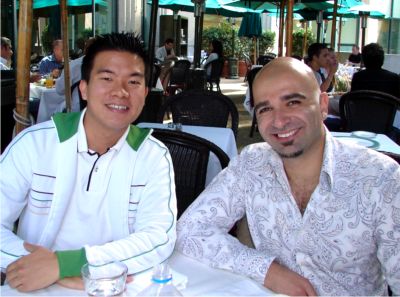|
way
for Vo to enter the world in the Windy City in 1980. A local
church helped the family get back on their feet while they
worked at a variety of odd jobs in their fight to escape
poverty.
Other
relatives had also been transported to America – one to Georgia
and another to Southern California. Soon after Kevin
was born all of the extended family members decided to reunite
and live near each other, about 40 miles east of Los Angeles
in Hacienda Heights where Kevin’s parents still live
today. The parents scraped together everything they had been
able to save and opened a couple of small video stores when they
reached the West Coast.
Though
they now had their own business, times were tough and would take
a long time to get better. “Early on we were very poor and on
welfare – just trying to make ends meet,” Vo recalled. “As
a kid you always want the whole world but my parents taught me
that they couldn’t give me the world – that if you want
something you have to earn it.”
| As
the years passed by his parent’s business began doing
better. Finances were still shaky, but they were willing
to sacrifice what they had to help their son get a
college education. “They |
|
always
believed in the importance of education so they took the
burden on themselves to put me through school,” Vo said.
With their contributions and a financial aid package from UCLA,
Vo was able to get into the famous university where he
majored in math. Though any source of extra money would
have helped, his parents told him to concentrate solely on
his studies and not try to work while he was going to
school.
This
was one time Kevin disobeyed his parents. “In 1999 I was
finishing up my freshman year and lot of people with crazy
ideas were getting a lot of money to fund Internet
ventures, so I figured if they can do it, I can do it
too,” Vo said. He had been fascinated by computers since
high school and self taught himself programming, html
coding and other computer skills. “During my freshman
year at college I would also go to the bookstore and get
every computer book I could find”.
With
that knowledge under his belt, Vo tried his hand at
several web businesses but all of |

Kevin
Vo |
| his
early efforts failed. Showing the true spirit of an
entrepreneur he kept at it though, learning from his
mistakes as he went. He finally found a combination that
clicked. Vo had put together a website for his UCLA
roommate’s boss and that client was impressed enough
to tell Kevin he wanted him to join him in a new
Internet advertising venture. They did well enough for
Kevin, who was still in school, to take an office on the
8th floor of a building on Olympic Boulevard,
just west of the 405 freeway. Their clients included the
NHL's Boston Bruins, but when the bubble burst,
revenue began drying up and Vo had to start looking for a
new opportunity. Little did he know he would find that
opportunity in the hallway just outside his office door. |
An
outgoing young attorney named Ammar Kubba, who is eight
years older than Vo, happened to be working on the same floor in
the office of an established solo practitioner. Kevin and Ammar
soon bumped into each other in the hall, but early on neither
could have guessed how that chance meeting would lead to a
strong friendship and business partnership that would change
their lives dramatically in the years ahead – and that their
future success would play out in that very same building where
TrafficZ’s offices currently spread across almost 12,000
square feet of space on two different floors.
| Kubba’s
path to that fateful first meeting with Vo was also
fraught with stomach wrenching ups and downs. Kubba’s
parents were both born in Iraq. His dad studied
abroad, earned a degree from England’s University
of Wales and went on to get a PhD in architecture
(he writes books on the subject today). His father was
working in commercial real estate development in England
|
|
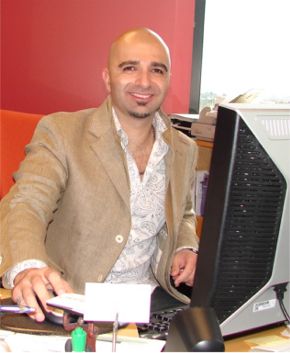
Ammar
Kubba |
when
he met Ammar’s mother on a business trip back to Baghdad.
She was ten years younger and finishing up college as an
English lit major. They were soon married and the union
produced Ammar who was born in Baghdad but spent his early
years in London where the family made their home.
When
Ammar was eight, the family took a vacation trip to
America to see the sites around Los Angeles. “They loved
it – just like everyone else who comes here does,”
Kubba told us. “They said Wow! – this is where we
want to be. My dad wrapped up all of his business in
England, sold our property and moved to L.A. where he
worked as an architect.”
However
for Ammar, the sudden change of scenery created some
immediate problems. Other kids his age went to third
grade, but his schoolwork in England left him academically
advanced enough to start in fourth grade in America. “So
I went in younger than the other kids, scrawny, very funny
looking and with a British accent. Of course everybody made
fun of me,” Kubba remembered. |
“On
the first day of school the teacher always asked the class who
would like to show the new kid around the school? Nobody raised
their hand except for one guy – his name was Marty
Mizrahi and we are still friends to this day,” Kubba said.
In fact, Mizrahi would also get involved in the domain business
as an adult (he operates LasVegas.net
today) and wound up bringing in the funny kid he befriended in
elementary school to work on his LA.com (more on that
later).
Continuing
to reflect on his early days in America, Kubba recalled
“Because everyone made fun of my accent I managed to lose it
in about three months. That made my parents very upset because
when you come from England there is a lot of pride in the
language and how it is spoken. But with everyone making fun of
me I had to find a way to fit in. It taught me the importance of
being social and I think that experience is the reason I am so
outgoing and friendly today. No one wanted to be my friend so I
had to learn how to make friends, fit in and create new
relationships. Marty Mizrahi happened to be the most popular kid
in the class so when he befriended me I really learned a lot
from him about building relationships.
“To
me the most important skill in the world is people skills
– interpersonal relationships. Understanding what people want,
understanding how to make people feel comfortable, understanding
how to connect. That is what I think is my greatest strength. I
want life to be a win-win for everybody. I love being
around people and am generally very comfortable in meeting new
people. To me that’s the most fun!” Kubba said.
|
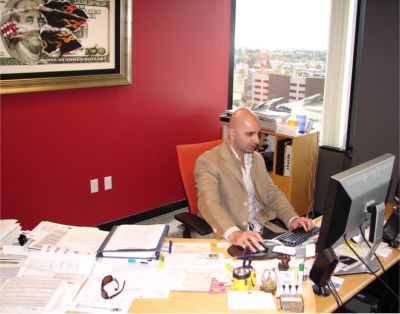
Kubba
in his 9th floor office at TrafficZ |
In
addition to honing his social skills early on, Kubba also
made a quick break from the entrepreneurial gate. “In
junior high school I got my dad to buy candy in bulk for
me, then I would resell it on the school bus. I would
always sell out in a day or two and have him buy more for
me - he would front me the money so I guess you could say
he was my venture capitalist!,” Kubba laughed. “I
always had spending money because I was always working. I
learned how to hustle – to buy low and sell high –
I’d see opportunities to make money where other people
didn’t see them.”
Kubba
tried his hand at many trades during his teen years. |
| “My
first job was passing out balloons in front of a furniture
store to get people to come in. Then I was a supermarket
bag boy, worked in fast food, and was a valet parker when
I got my driver’s license. My dad wanted me to learn
about computers and bought me a Timex Sinclair,
then an Apple II, and others down the line -
including the first Mac. That led me to start
another business selling repackaged computer software. All
of that taught me a lot about what it takes to be
successful. You have to be willing to do whatever it
takes.” |
His
own brush with poverty also contributed to Kubba’s
strong work ethic. “My parents got divorced in 1986, at which
time I was 13 going on 14,” Kubba said. “My father had
recently moved overseas, leaving my Mom to take care of my
younger brother and I by herself. Prior to the divorce, she
did not have a steady, full-time job, nor did she have any
savings," Kubba said.
"That
summer, after school had ended, I went to stay with my father
(in Amman, Jordan) for a couple of months while my
brother went to stay with our uncle in Toronto, Canada. Our
Mom needed some time to figure out what to do and to come up
with a plan. While we were away, unable to afford the rent
on the townhouse where we used to live, my Mom had to move us
into a one room guesthouse that belonged to a family friend. My
brother and I slept in a bunk bed and my Mom slept on the couch.
We had no kitchen and shared a tiny bathroom.”
|
“Despite
the dire situation that my Mom had found herself in, she
wouldn't allow herself to fail, and she was determined
to make a good life for our family, no matter what. The
guesthouse that we were living in was located in a
not-so-great neighborhood, and was outside the
geographic boundaries for the high school that my Mom
wanted me to go to. To get around that issue, my
Mom used a friend's address within the "right"
neighborhood so that she could register me at the better
high school.”
“Determined
to get back on her feet, my Mom quickly found two new
jobs, one as a loan officer and one as a
salesperson at a retail clothing store, which she worked
simultaneously. Within a few months of starting the
new school year my Mom had saved enough money to move us
into a nice one-bedroom apartment in a nice
neighborhood. Less than a year after that, she
moved us into an even nicer two-bedroom apartment
in the same complex. By that time, my |

Kubba
(at far left above) lived in cramped quarters
as a young teen but as this shot from TrafficZ's
spacious conference room shows - elbow room is
no longer an issue for the successful entrepreneur. |
| Mom
had transitioned into a new position as an account
rep for a title insurance company, where she quickly
learned the business and excelled. From that point on,
my Mom's success continued to grow, and we
never looked back. For what she went through and for all
that she sacrificed for us, my Mom will always be my
hero,” Kubba said. |
“I
think that those years were pivotal in shaping my
ambition, my drive, my personality and my values. Although
they were difficult times, it was then that I learned and came
to understand the importance of a strong family bond and of
good, true friends. NOTHING in this life is
more important to me than my family and my friends. It was
also during that time that I learned the importance of 1)
being able to adapt to whatever the situation, i.e., roll with
the punches; and 2) the role and power of determination
in success, i.e., if you want something bad enough, you can
make it happen.”
Like
his future partner, Kubba also wound up going to UCLA with plans
to proceed to law school. “I always knew I had to be a doctor
or a lawyer because that’s what my mom told me! Education is
very important in our family - my maternal grandfather was a
lawyer and in politics in Irag and my paternal grandfather had a
PhD. My parents instilled in me that you had to do something
with your life and in their mind being a doctor or lawyer
epitomized that. I was always very bad in science – it was my
weakest subject – so medicine was out of the question. My
greatest strength was writing and reading comprehension –
language based stuff – so law made sense to me. I was always
told I was a good debater and very stubborn,” Kubba said.
| “You
can take any major for law school. I started out as a
biz-ecommerce major but I found economics was a lot like
a science and I didn’t like it at all so I switched to
philosophy in my third year. Philosophy taught me a lot
of things that helped me through life. I believe that my
fondness for the Greek philosopher Heraclitus
is tied to those teen years when my parents split up and
life took a big turn for the worse. It was then that I
first learned that "You cannot step into the same
river twice, for it is forever flowing," and
"Nothing endures but change."
“These
concepts have been instrumental in my and TrafficZ’s
success - understanding that the world (and
especially our industry) is in a constant
state of flux, we must always strive to |

Heraclitus
depicted in a painting by Flemish
artist Johannes Moreelse (1602-1634) |
| identify
and recognize change before it happens and to use that
insight and knowledge to help shape the future,” Kubba
said. |
After
graduating from UCLA, Kubba went on to get his law degree across
town at Loyola. That helped him land the job in the law
office located in Kevin Vo’s building. “The attorney I
worked for did corporate and securities law which was very
interesting to me. I liked corporate law because it translated
into business – contracts, negotiation and all of these other
things that translate very easily into running your own business
which is where I wanted to go,” Kubba said. “In fact, I knew
before I ever decided to go to law school that I wasn’t going
to be a lawyer. But I went for my mom, so I can say OK I have
the law degree - now I can go do whatever I want to do.
It’s a good background to have though because it teaches your
skills that you can apply to other things.”
“So
I did that for a few years with him and learned a lot because
when you work for a small firm you do everything. I got very
diverse experience, diverse client contacts and dealt with the SEC
and other governmental agencies. When I started with him we also
made an agreement that I was allowed to have my own clients
outside of the firm and so I started doing that right away with
friends recommending me to people they knew.”
|
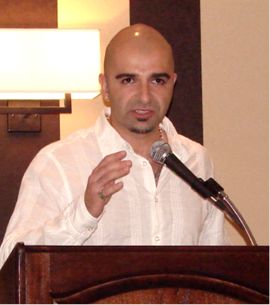
Kubba
speaking at the Domain Roundtable conference
in Seattle (August 2007) |
“As
it happens, Marty, that first friend from fourth grade,
referred me to one of his friends who was a domainer (Editor’s
note: his name withheld by request). He wanted me
to do all of his contracts, escrows, and negotiations
– everything related to his domain business. He had
about 30,000 domains which back then (in 1998-99)
was a lot. We became friends and he wanted me to start
working with him. He taught me a lot and told me I
should start buying domains. I saw he was selling these
domains he bought for $16 for $15,000-$20,000
and regularly because all of these transactions
were running through the escrows I handled,” Kubba
said.
“He
then asked if I knew anyone who could program. I had met
Kevin in our building and knew he was into computers so
I told Kevin the guy would pay $500 if he could
write a script for him. He said yes, so I
introduced them and they started working together on
that. Kevin then said to me we should start registering
some |
| of
these dropping domains. I didn’t have any money
because I owed $110,000 in student loans and was
barely making enough to pay my loans and my rent. I came
up with around $1,000 and Kevin came up with some
and we registered a few hundred drops and started
monetizing those through a couple of the really crappy
traffic buyers who were around then – whoever would
pay the most. But then we started selling them and we
made all of our money back pretty quickly. But we
didn’t think about reinvesting it. We were
excited that we had more money and I could pay more
bills but it was like a one time deal.” |
Kubba
would end up going off in another direction while the lead he
gave Kevin planted a seed that Vo would soon cultivate and turn
into TrafficZ. The client hired Vo to develop more domain
related software for him, then asked him to see if he could get
a monetization contract with GoTo.com for him (GoTo was a
predecessor of Overture and Yahoo that paid for
domain traffic on a PPC basis). While negotiating that deal Vo
said “A light bulb went off and I said “I can provide
a service for people and make a percentage of their overall
income, rather than just working for the small fixed fees I was
making at the time.”
|
Vo
had put together a basic system for monetizing domains
through the providers of the day but now he started
thinking about building a far more robust system. A
negative event – his girlfriend breaking up with him
– turned out to be a positive as he now had time on
his hands and a desire to plunge into a project that
would take his mind of that situation.
“I
reprogrammed the whole thing from bits and pieces I had
done and by the first week of September in 2002 I
started contacting people offering this improved service
to monetize their domains," Vo recalled. The
way
things played out, the plug was almost pulled before
TrafficZ ever got out of the |
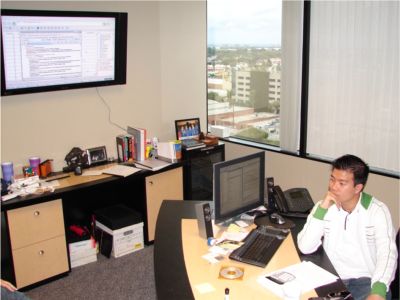
Vo
listens to a guest in his 9th floor office at TrafficZ |
| crib.
"I
decided I would give it one week and if I did not
have any clients by the end of that week I would drop it
and move on to something else," Vo said. "I
had had so many web ventures fail that I didn’t want
to waste too much time on this if it wasn’t going to
pan out. After four days of cold calling I had gotten no
interest, so if I didn’t get anyone on the last
day – Friday – that would be it. That day
I got an email from Robert Kieren at NameProdigy
telling me he wanted to give me a shot with his
portfolio.” That started the ball rolling for Vo and
it has been barreling along gaining momentum ever since. |
He
christened his new corporation Thought Convergence, Inc.
with the slogan “Where Ideas Come Together”. His new
PPC operation was dubbed TrafficZ and within a year he was able
to land his first contract with Overture, a deal that
immediately increased his payouts by a factor of 6-10 times
what he had been getting from his previous providers. “That
was huge,” Vo said, “Once we got that we really
started generating some money.”
Things
continued to grow like wildfire with Vo trying to do everything
himself. In thinking about getting help, his thoughts often
turned to the personable new attorney on his floor – Ammar
Kubba – whom he had started to hang out with while Kubba was
busy doing his own thing.
|
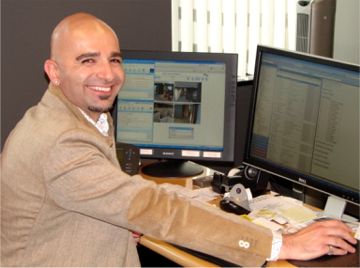
|
Kubba
said, “One of the clients of the firm I worked for ran
a public company and offered me a job to come and work
for them as an in house counsel. It was like double what
I was making, so I went with him and got to work out of Beverly
Hills for a couple of years. It was such an easy job
– I worked about 2 hours a day – got paid a lot of
money (for me) and I just got to walk around Beverly
Hills and shop and look at the cute girls but I got
bored. As a result I took that spare time to work on
more business ideas.”
“By
this time Marty Mizrahi had gotten involved in domains
and had LA.com, Vegas.com and some other
great |
| names
like NewJersey.com, Illinois.com and Hawaii.com.
He had moved to Las Vegas, but he called me and
said he was moving back to L.A. to launch LA.com and
wanted me to come and work with him on it. So I got a
piece of LA.com in exchange for doing all of the legal
and business stuff. I started doing that during the free
time I had on the in-house corporate job.” |
“But
this was just after the bubble had burst and no one was
interested in our Internet model. Nothing came of the business
but we had these great properties and ended up selling
off most of them. LA.com is the one I wish we had never sold. It
went for a lot of money by the standards of that time – but
not by today’s standards. Gannett, who owns the Los
Angeles Daily News and USA Today bought it and that
big sale got me more interested in exploring the Internet
space.”
“I
met a couple of guys who had started an Internet company they
sold for over $110 million right around the bubble
period, but they took almost all stock and only wound up with
about $4 million in cash when the bubble burst. But they
had cash and were starting a new company and invited me to work
with them. It started out as an adware provider but I had an
idea to take the adware model and use it for internet monitoring
for security purposes. I met with security and intelligence
agencies around the world pitching the products and almost made
a deal for $20 million - but it kept dragging on and on
through 2002 and most of 2003 and never got completed.”
|
“I
got to see a lot of new places and meet with high level
people but it was disheartening because nothing ever
came of it. So I divested my interest in it at about the
same time TrafficZ was starting to make some money for
Kevin and he was at a point where he could no longer do
it all on his own. We talked about it for about six
months (starting in early 2003). He knew I wasn’t
happy with what I was doing,” Kubba said.
Vo
added, “Ammar was at a crossroads in his life
where he was interested in getting out of law. I told
him I knew I could make more money if he joined me
because he could fill in some skills I didn’t have. He
is an extrovert and is not afraid to go up to
people and start a conversation. I am an |
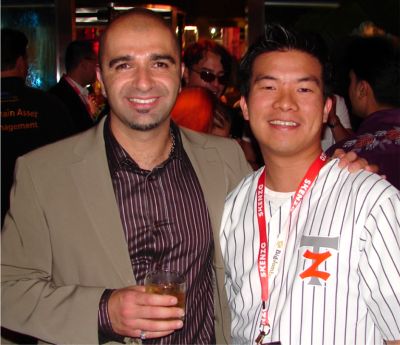
Kubba
and Vo at the TrafficZ party they hosted in
June 2007 at the T.R.A.F.F.I.C. New York conference |
| introvert
so I like to keep to myself and stay under the
radar. You never see me speaking on panels at
conferences and making public appearances, but Ammar is
not afraid to do that.” |
Kubba
picked up the story, noting “He finally said “I need some
help on the business side of this enterprise and I will give you
equity in this business – all you have to do it get me a Google
or Yahoo contract.” I said “that doesn’t sound too
hard!” and agreed."
| At
the time, Vo was relying on a secondary Yahoo feed
provided by Walnut Ventures. In November of 2003
he and Kubba got a meeting with Google's Eytan Elbaz
whose |
|
office
was in nearby Santa Monica.
“Eytan only agreed to the meeting because
Kevin had been hounding him for I don’t know how long,"
Kubba said. "Eytan figured I’ll just give these
guys a quick tour and then say “see you later”. But
we told him what we were up to and by the time we left
Eytan said I will get you a term sheet in the
next few weeks. We left his office and we were really
happy – this was a big breakthrough!”
“However,
Google doesn’t move fast ever, so the term sheet took
a few months instead of a few weeks. I continued to
correspond with Eytan but by February 2004 I still
hadn’t gotten the contract. But Kevin and I were
working well together and decided to keep going. So I
got my own office and started spending more and more
time on TrafficZ because I really enjoyed the
business,” Kubba said.
“We
were having problems with our third party Yahoo provider
(Walnut) and they tried to force
|
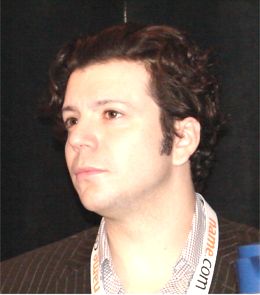
Eytan Elbaz, Google.com |
|
our hand, saying Kevin
would need to sell out to them
or they would drop our feed. At that point if we lost
the feed we would be pretty much out of business. As
fate would have it, we finally got the Google term sheet
as this was happening so we knew we had a backup. We got
another break when Yahoo called us saying they wanted to
learn more about our technology. They invited us to a
meeting in Pasadena and after we told them about
out problems with Walnut they wound up offering us our
own direct feed. So we were able to turn it around and
the Walnut contract was terminated. In June
2004 we decided to go with Yahoo and finally had
our direct deal.”
|
“At
that point I had done my job,” Kubba said. “I had earned my
share of company equity and could have gone off and done
whatever I wanted, but at that point I was really enjoying it
and told Kevin I wanted to keep going.”
| Vo
said he was very happy about Kubba’s decision to stay
onboard full time. “We both got this good vibe about
it – that this was going to be huge. The first week he
came on software was |
|
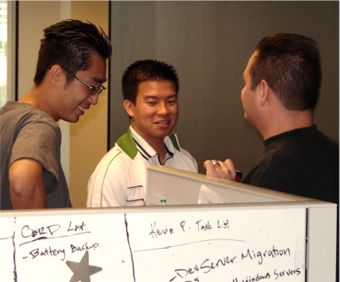
Vo
(center) with two of TrafficZ's
more than 30 staff members |
crashing
left and right and I had to go fix it. He said “What
can I do to help?” I said we have to do payments
and showed him how to do it. While I was fixing the
software there was Ammar getting his hands dirty –
this skilled lawyer doing monotonous data entry stuff
and that’s when I said to myself “he is in it for
the long haul.” They soon added one
employee, then two and it started snowballing to where
they now have over 30 at TrafficZ.
Vo
gave another reason why their partnership has been a
marriage made in heaven. “We are both experts in our
own respective arenas and we respect each other’s
authority in the area we are strong in. I am on the
tech/infrastructure side and Ammar’s strength is being
able to connect with people and being able to make a
deal happen.” |
Kubba
agreed, adding “Kevin and I were really clicking. Everything
that is my weakness is his strength and vice versa. First and
foremost we are friends and the business is secondary.
There have been times along the way where I have taken a step
back and said “Kevin I’m not happy with how the business is
going but I don’t want it to interfere with our friendship. So
their were times I was willing to walk away from the business to
preserve our friendship because that was more important. Because
we both feel the same way that has helped us resolve any
business issues we have had because we come at it as friends and
we care about each other so we should be able to figure out how
to make it work.”
“I
also think a big part of why we were successful early on is we
knew how to make due with less. Our strongest competitors
had over 100 people and we had less than 10 but we had
technology that we felt was better in many ways than theirs. We
heard that competitors were wondering how we did what we did –
thinking we had 100 people too. We stayed lean and that is our
philosophy. We don’t want to hire more people than we can
really use and do things just for the sake of saying we did it
or to be be “big”. Everybody and everything we
have in the company serves a purpose. I think we are very
efficient with our employees and our technology and I think that
is why we have been able to grow successfully.”

Members
of
the TrafficZ staff gather around Vo and Kubba in the office
foyer
Kubba
said a key event in TrafficZ’s explosive growth was their
decision to exhibit at the T.R.A.F.F.I.C.
West conference in Las Vegas in May 2005. “We
drove across the desert from Los Angeles in a rented van with no
air conditioning and no radio,” Kubba recalled. It was a
nightmarish drive but we went because we thought we had a
deal in hand to sell the company that would give it big money
backing. When we got there I made some pretty bold claims about
what would be happening at TrafficZ (with the blessing of the
prospective buyer who cannot be disclosed due to an NDA).
However, one of our upstream providers had a right of first refusal on TrafficZ
and at 10pm on the final day they could exercise
their option, their corporate counsel called my cell phone and
said they were exercising it.”
| “That
stopped the other deal and started a due diligence
period with the other suitor that drug on forever – but that was
the best thing that ever happened to us. It was a
lot of money but the company is worth far more now than
it was then. When people saw what we were doing at |
| T.R.A.F.F.I.C.
our business doubled within just a few months.
So, then we were actively trying to make the sale not
happen and we succeeded. We went to the next show and
every show we have gone to since then has produced a
huge spike right after.” The T.R.A.F.F.I.C.
exposure has worked out so well that TrafficZ became the
lead sponsor of the event.
The
first time I personally met Kubba was at the T.R.A.F.F.I.C.
Silicon Valley show in January 2006 in Santa
Clara, California. We were on one of the buses that
show organizers brought in to transport attendees
to Google’s headquarters in nearby Mountain View
for an evening party. Though it was after dark, Kubba lit
up that bus and the walkway through the Google
campus with the sheer vitality of his personality. He is
one of those people that you can’t help but enjoy
being around.
While
Vo has a different personality spending time with him
recently made it obvious that he need have no fear of
the spotlight either. While he is naturally quiet and
reserved, Vo is an exceptionally intelligent,
well-spoken man whose polite |
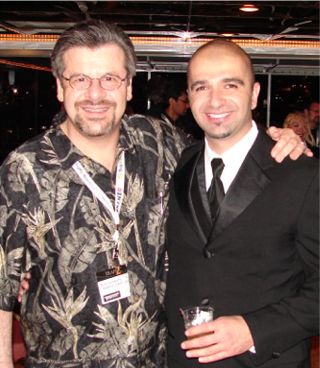
Kubba
with T.R.A.F.F.I.C. co-founder Rick
Schwartz on TrafficZ's party cruise at the
2006 T.R.A.F.F.I.C. East conference
in Hollywood, Florida |
| demeanor
immediately puts visitors at ease. If he is inwardly
uncomfortable around unfamiliar people it isn’t
something that showed on the outside and as time goes on
I'm sure this creative young entrepreneur will continue
to blossom socially as well as professionally. |
|
Aside
from the personal strengths the two company leaders
bring to the table, TrafficZ’s growth can be
attributed primarily to the fact that they are constantly
innovating in the PPC (pay per click) space. They
were among the first to start providing attractive
graphics-rich landing pages. |
|
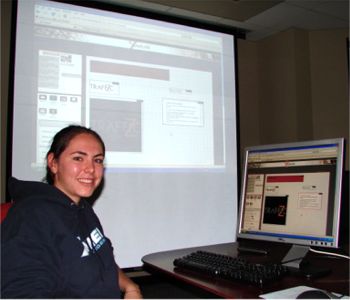
Clelia
El Adl gave us a sneak peak
at what's coming next at TrafficZ |
While
I was visiting their Los Angeles offices for this story,
Kubba and project manager Clelia El Adl gave me a
preview of a new system scheduled to roll out in the
first quarter of 2008 that will give clients the ability
to totally customize their landing pages,
changing every element on the page with an easy
drag and drop publishing interface. A lot of systems
allow some degree of customization now but nothing like
what I saw is currently on the market.
“As
web users get more seasoned and recognize parked pages
they are going to want more from them – they will want
to get some utility out of those pages and that is where
TrafficZ is trying to push the envelope," Vo
said. "We want to give them pages that give them
something useful – so they have stickiness and they
won’t |
| be
so fast to close them. We think the evolution of the
parking page is only going to get more complex and that
people are going to want to create their own page
templates. I can see a day coming in the next year or
two when I can come across parked pages on our own
system and not know that is what they are because
the owners will have created totally unique
pages.” |
Just
as the future of the parked page will continue to evolve, so
will Vo and Kubba’s business interests. They are already
looking far beyond the PPC arena. “We want to have
something that touches everybody in the world in the way
that Google toches everyone," Kubba said. “The vehicle we
have to do that is Idea.net that is sort of an incubator
for joint ventures where we take ideas or great .com domain
names, whether they are ours or come from partners, and put our
resources, relationships and knowledge behind it to build a
business. When they can sustain themselves, we can spin them off
into independent companies. I would like to be involved in 100
plus of these projects. Then we could take it public and within
those 100 will be some that will touch the world,” Kubba said.
| “We
think Cost.com
(a joint project with the owners of the domain – Michael
and David Castello who were the subjects of our December
2006 Cover Story) could be one that could do
that - that it could become the world’s most popular
shopping site. BizDev.com will become the first
social networking site for businesses and professionals.
We have lots of these ideas and we don’t necessarily
want to do just Internet stuff, we are interested in
diversifying into other arenas.”
On
Cost.com, Vo added “We want it to be the portal
you go to when you buy anything on the Internet.
We’re bringing together all of the best features of
the other portals out there including coupons and
rebates and pretty soon we’ll be building the product
search engine. So when there is a product you want to
buy, we will calculate everything for you so you know
the best place to buy." |
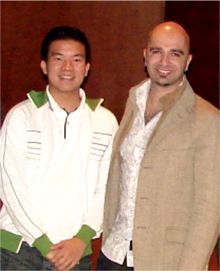
|
|
“Kevin
and I really enjoy the startup mentality and once
you get to a certain point it is not as much fun,”
Kubba said. “So we want to do a lot of these
startups because that is where the excitement is.
The only thing that is stopping us from going full speed
on that is we haven’t |
|
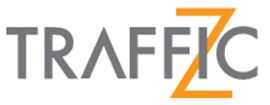
|
won
the game on the parking side yet. Our goal is that
within the next year we will win that game. Our goal is
to be indisputably the top parking company with the best
technology, the best relationships, the best everything.
Once we win that then we can move on. We have already
started these other projects but there is still a lot to
be accomplished with TrafficZ so that is where our
passion is right now.” |
*****
|

